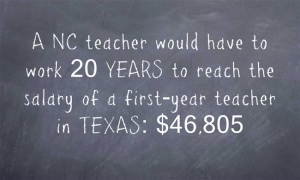When Teaching Speaks Volumes gets more traffic than usual, it also typically means I’ve ruffled quite a few feathers. Last week’s post was no exception.
- “Why don’t you just quit if you don’t like it? “
- “At least no teacher level will be making *less* money then last year.”
- “The Democrats/Beth Perdue/previous administrations didn’t do any better. “
 I’m so weary of those who say teachers should just give up the fight (as if many haven’t already) or suggest we have to compromise, as if that’s not what we’ve already been doing all along. And yes: the teacher status in North Carolina has repeatedly fluctuated between mediocre to abysmal to mediocre to abysmal for a long time. As I’ve told those who want to fight “team politics” before, I don’t see the point in rehashing who did exactly what when in our history. Now… right this moment…the teaching profession is under assault by the current NC policy makers.
I’m so weary of those who say teachers should just give up the fight (as if many haven’t already) or suggest we have to compromise, as if that’s not what we’ve already been doing all along. And yes: the teacher status in North Carolina has repeatedly fluctuated between mediocre to abysmal to mediocre to abysmal for a long time. As I’ve told those who want to fight “team politics” before, I don’t see the point in rehashing who did exactly what when in our history. Now… right this moment…the teaching profession is under assault by the current NC policy makers.
Maybe not all teachers are under attack, but teaching as a profession certainly is.
- Offering raises to the younger teachers, but at the top most veteran level offering one-third of 1%.
- Removing longevity pay for those that continue to bring their expertise to NC classrooms
- No longer advancing salaries for advanced degrees.
- Attacking tenure which puts teachers under threat of being unfairly fired
Teaching is clearly not respected as a noble profession, or even a profession at all: It’s a “starter job”. You know, like a starter house? They seem to believe it’s what you do when you’re too young or inexperienced to get a “real” job. If you’ve been teaching longer that 20 years, it’s an expensive liability, not a strength.
 And honestly, teachers would probably not give two cents what legislators thought, since we don’t think very much of them, except they get to be in charge.
And honestly, teachers would probably not give two cents what legislators thought, since we don’t think very much of them, except they get to be in charge.
Knowing and understanding nothing about us and what we do, they get to be in charge.
And they are not only ignorant about what we do… but have open contempt for those who do it.
And then there’s my own experience with Representative Bob Steinburg this week:
He says the national average of teacher pay doesn’t matter except we’re ranked number 32 now, however if that is true, why would he be so angry in the next sentence that we’re “talking national averages’? I asked several times for a source backing up this new 32% ranking, but he failed to provide any.
He did, however, post part of our conversation on his own facebook wall and make fun of teachers and how greedy we are with his followers, as I predicted would happen in the very post he’s calling garbage. I’m not a bit surprised that he and Representative Owens talked about teachers in the way I predicted, but I am a little surprised Mr. Steinburg put their contempt for teachers in writing. After all, he won by less than 5,000 votes.
We need to make it very clear that, while they hold teachers’ jobs in their hands as law makers, we all hold their jobs in ours as voters.













![Vol.#41: The White Flag [Guest Post]](https://teachingspeaksvolumes.files.wordpress.com/2013/10/whitteflag.jpg?w=560&h=234&crop=1)



